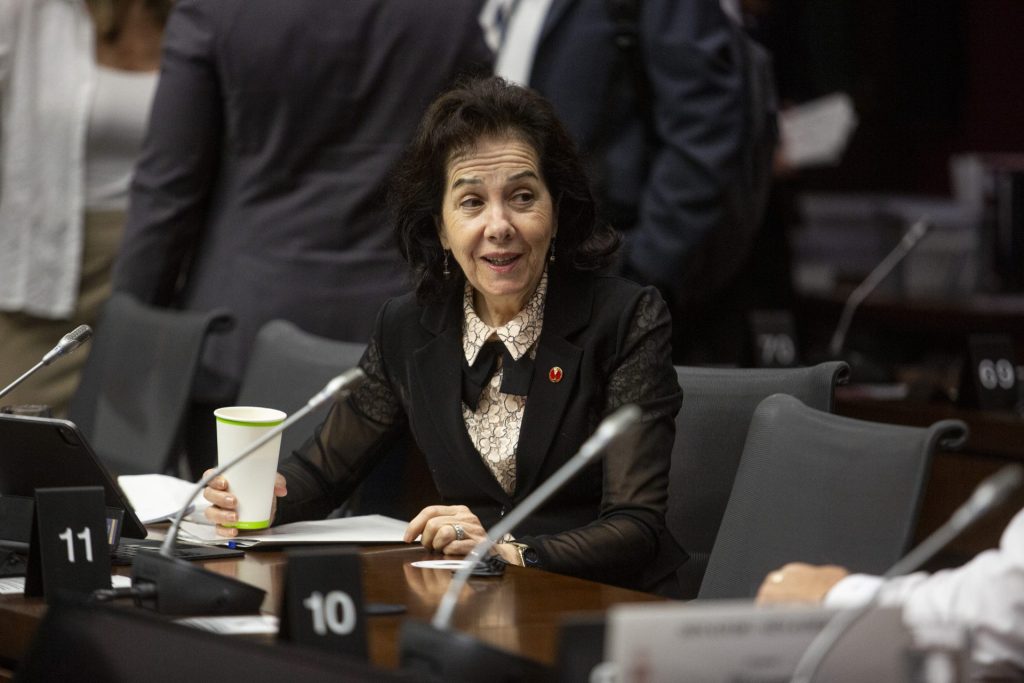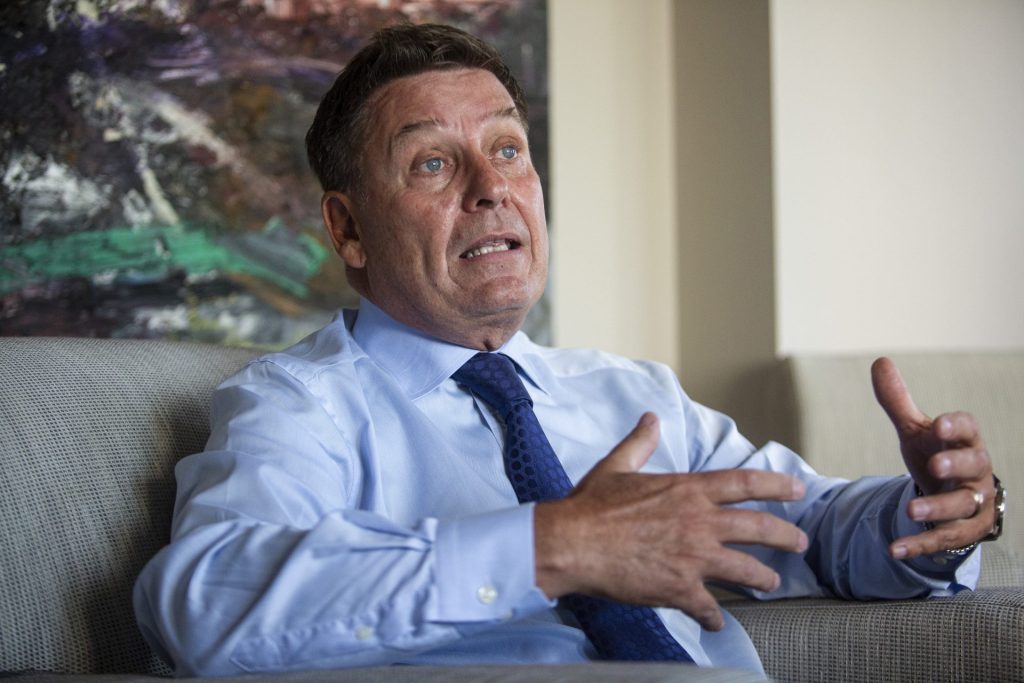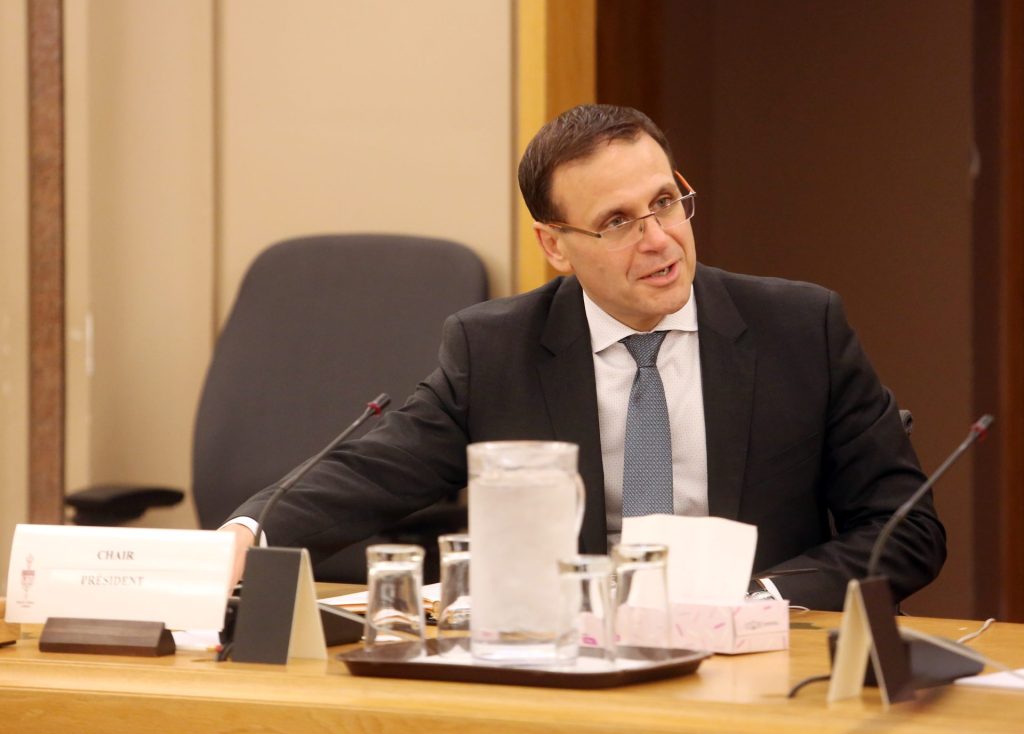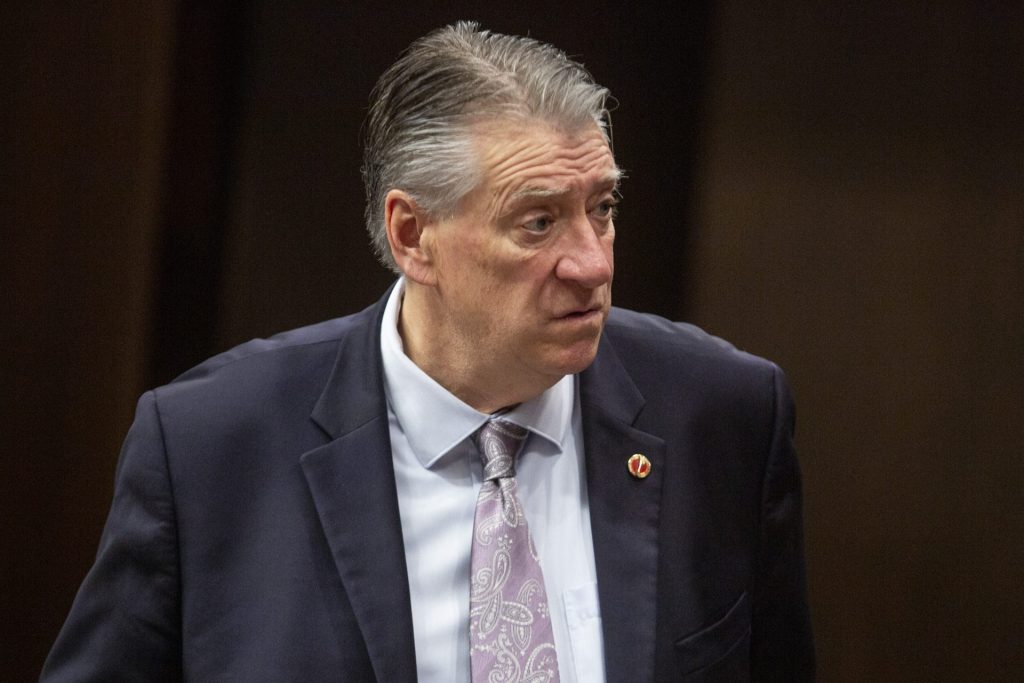‘No ordinary Parliament’: Senate leaders prepare for ‘new era’ of quick legislation, pledging collaboration as fall sitting begins

A slate of new leadership means the tone in the Senate has shifted with an eye to efficiency, says Senator Scott Tannas, as his colleagues champion collaboration while they gear up to tackle the government’s ambitious legislative agenda and hotly-anticipated fall budget.
“There’s a new tone being struck,” said Tannas (Alberta), the leader of the Canadian Senators Group. “There’s a new kind of atmosphere there that, I think, lends itself to us achieving the goals of … adding value and making sure we’re maximizing the usefulness of the institution.”
Independent Senate Group (ISG) Facilitator Raymonde Saint-Germain (De la Vallière, Que.) also pointed to a shift in attitude among the 100 appointees to the Red Chamber, which to date has five seats vacant that Prime Minister Mark Carney (Nepean, Ont.) can fill.
“Senators are not disconnected from the reality, from the challenges this government is facing,” she said. “This is why there is, I would say, a collegial climate—a realistic analysis of our political environment and the need for us to be efficient in order to be credible to Canadians.”

The Senate returned from its summer recess on Sept. 23. That day also marked the first day non-affiliated Senator Pierre Moreau (The Laurentides, Que.) spoke in the Chamber since taking on the role of government representative in the Senate. Moreau was appointed to that position on July 18 after his predecessor, Marc Gold, reached mandatory retirement age this past summer.
“The grandeur of the projects the prime minister envisions signals that the government’s agenda is no ordinary agenda,” Moreau said in his first speech leading the Government Representative’s Office (GRO). “Colleagues, this is no ordinary Parliament.”
Before the Senate rose for the summer, the Chamber okayed Bill C-5’s swift passage into law. It dealt with internal trade and a portion known as the Building Canada Act gave cabinet the authority to bypass legislation to fast-track projects deemed in the national interest.
The speed at which the bill was passed—as well as its contents—have been criticized by Indigenous leadership, environmental advocates, and some Senators who worry it could be used to by the government to force project developments on them.
Moreau emphasized to The Hill Times that not all legislation will be passed like C-5, which took just 20 days to be approved by both chambers, including only two in the Senate following an earlier pre-study of the bill. Still, he said the bill wasn’t passed because the body was “whipped to adopt a time frame,” but because Senators voted for it.
He acknowledged, however, that many in the Chamber would prefer more time to study legislation going forward—and that’s something he means to stick to.
“I’m very well aware that many Senators wouldn’t like the future to be like it was for C-5, but at the same time, I think they realized that it was important for us to go through the Senate with C-5 on a timely manner,” he said.
“It is not my intention to ram any legislation through the Senate only on the basis of efficiency,” he explained.

Tannas said C-5 was “clearly articulated” and “debated” in the election campaign, and that the legislation passed to the Upper Chamber with support from the opposition, which made it a unique case.
“We’re not there now,” he stressed. “It’s a new fall, a new era—time for us to buckle down and make sure that we are delivering value.”
Moreau will be sparring with a new opposition leader this fall. Longtime Conservative Senator Leo Housakos (Wellington, Que.) is leading his caucus after taking over from former senator Don Plett, who retired on May 14.
The Progressive Senate Group also has a fresh face at its helm: Senator Brian Francis (Prince Edward Island) became the group’s leader on May 15, taking the reins from former leader Senator Pierre Dalphond (De Lorimier, Que.), who had served in the position since 2024, and who recently re-joined the ISG.
Housakos told The Hill Times on Sept. 22, before the Senate had resumed, that he was waiting for the government to “set the tone,” but that he’s hoping for a “collaborative” one.
“That’s the benefit of winning an election,” he said. “That’s who has that privilege of setting the tone in the agenda.”
“We hope to see from the Carney government what we didn’t see from the Trudeau government, which is a respect for Parliament, and particularly a respect for the voice of the official opposition,” Housakos said.

He added that in the Senate, not being an elected body, “it’s very difficult for the institution to maintain its legitimacy and to maintain its representativeness” when an opposition party loses four elections in a row, as the federal Conservatives now have.
“We’re going to need to work together with the government caucus—and with the government itself—to make sure that the Senate remains legitimate, that the opposition can remain functional and do its job,” Housakos said, noting that Conservatives have 42 per cent of the seats in the House of Commons, yet the their caucus in the Senate represents 13 out of the 100 currently sitting Senators.
The group gained three members in June, after not adding to its membership for over 10 years. It remains the smallest group in the Senate.
New Conservative leader ‘first and foremost’ behind tone shift, says Saint-Germain
Saint-Germain told The Hill Times she’s expecting “complex” legislation from the government this fall.
She pointed to Bill C-3, which proposes changes to the Citizenship Act; Bill C-2, The Strong Borders Act; and the cybersecurity Bill C-8; as pieces of legislation soon to be on the Senate’s plate, but emphasized the body will not act as a “rubber stamp.” The Senate will also soon have Carney’s first fall budget to study, which the Liberals say will be tabled in the House on Nov. 4.
“I’m not aware of any conversation … [about] time allocation or about rubber stamping,” Saint-Germain said. “It’s about planning the work for us to be able to make sure that the bills are improved.”
When asked about the Senate’s new GRO and how Moreau’s leadership could affect the Chamber, Saint-Germain said she was “optimistic.” She added that the tone in the Senate leaders’ first leadership meeting of the fall session—which will continue weekly while the Senate sits—was “collegial” and “efficient.”
Saint-Germain also said the change in attitude in the Chamber, “first and foremost,” is linked to Housakos’ new role.
Tannas agreed: “We shouldn’t dismiss the fact that we have a new opposition leader.”
Francis pointed to leadership changes, as well, noting in addition to Moreau and Housakos’ appointments, both Tannas’ and Saint-Germain’s terms will be up before the end of the year, bringing even more leadership changes.
Like Saint-Germain, Francis emphasized his hope for leaders to be collaborative, saying it’s a “key pledge” of his.
Tannas told The Hill Times the last four years of then-prime minister Justin Trudeau’s minority government, coupled with the COVID-19 pandemic, meant “a lot of challenges” for the Upper Chamber.

There were “lots of ups and downs, starts and stops,” he said, “where, we in the Senate, felt constrained in doing our job properly in many instances.”
Tannas said legislation took “a long time” to pass to the Senate from the House, and would sometimes come through in an “unrecognizable form” from its introduction. He added that the Senate was often asked to rush legislation through, and not amend it, as doing so would mean having to return it to a “chaotic minority government.”
“I’m hopeful that [with] this new government with a kind of calm, confident business approach to the business of legislation that we will be able to get back and really maximize the value that we can provide,” he said.
The feeling seems to be shared. Moreau said that in his discussions with Senate leadership so far, there is a consensus on “the way things should be done.”
“I had [a] discussion with Senator Tannas, and he’s the one who said, ‘we don’t want the bill to be run through the Senate,’” Moreau said, “and I totally agree with that, because it’s our constitutional duty.”
Editor’s Note: This story was updated on Sept. 26 at 11:45 a.m. to reflect that Senator Pierre Dalphond became leader of the PSG in 2024.
ewand@hilltimes.com
The Hill Times






 LICENSING
LICENSING PODCAST
PODCAST ALERTS
ALERTS













